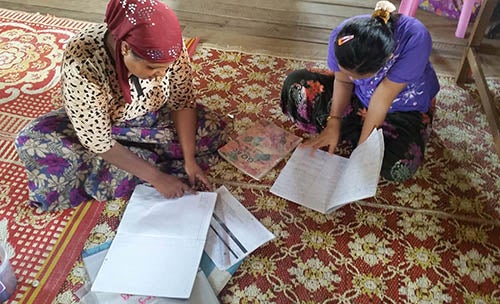Despite living a life far from ideal in the Say Tha Mar Gyi camp for displaced people in Rakhine State, women get a sense of normalcy in a space especially established for them through the support of UNFPA, the United Nations Population Fund.
At the Women and Girls Centre (WGC) women from the camp are welcome to join various activities organized as a form of psychosocial support for them to cope with life in the camp. The activities include embroidery, beading and sewing.
Ma Hnaung, a gender-based violence (GBV) Prevention Officer at the WGC, says all the activities they conduct are what the women from the camp specifically requested.
“Before we do any activity, we consult with the women and girls living in the camp to ask what they prefer,” Ma Hnaung explains. “They say what activities are most interesting for them and they usually choose those that will be useful for the community.”
“It is very suitable for them because it gives them an opportunity to learn some skills which they can eventually use for livelihood,” she adds.
Aside from the recreational activities, information sessions on GBV are also regularly conducted at the WGC with 25 women and girls participating in each session.
According to Ma Hla Khin, a case worker at the WGC, the most discussed issues during the information sessions are the needs of women and girls in the camp and their protection concerns, especially GBV.
The WGC also provides GBV counseling. The facility has a private room where women who come for counseling have the privacy to talk to a trained case worker like Ma Hla Khin.
The WGC initiative is a partnership between UNFPA and the government, and it is supported by the International Rescue Committee, which provides training for case workers.
There are a 13 camps in Rakhine State hosting families displaced by both conflict and natural disasters.



